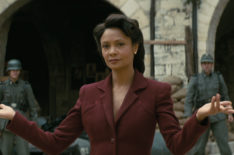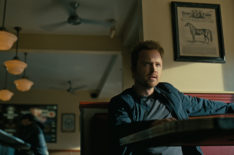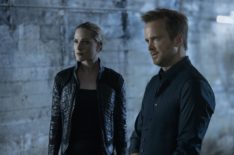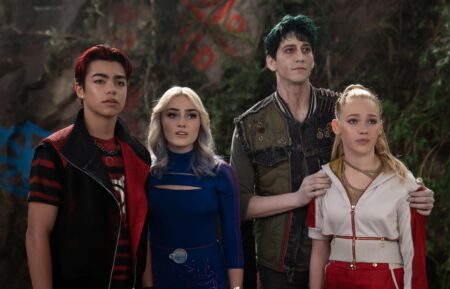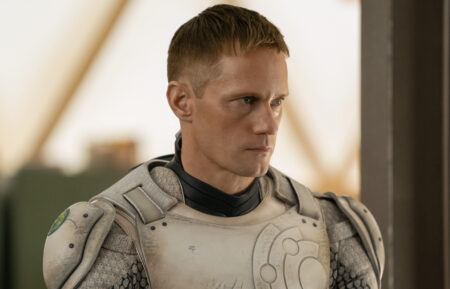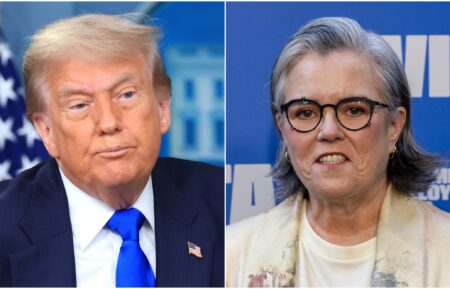‘Westworld’ Welcomes the End of the World in an Unsatisfying Finale (RECAP)
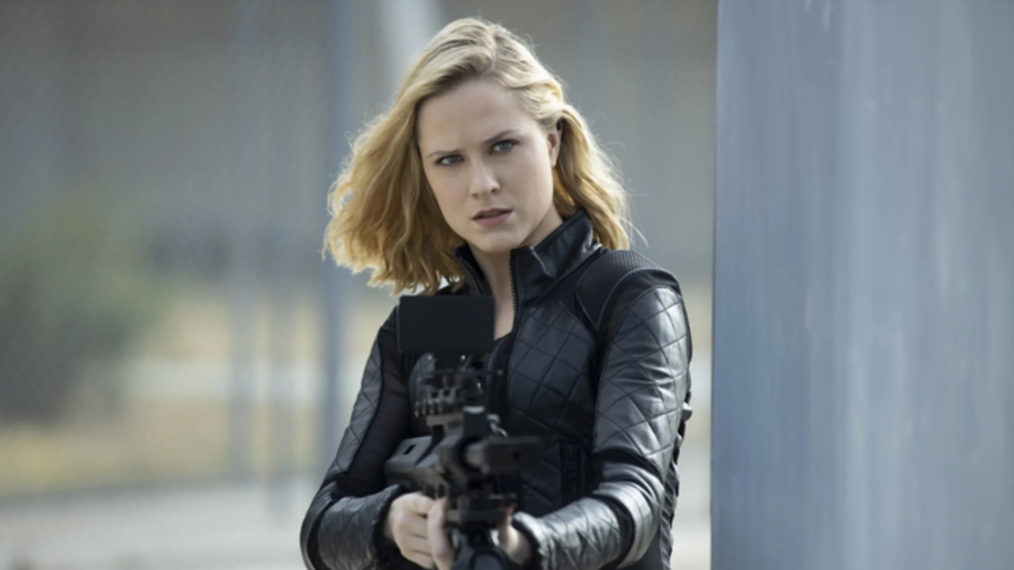
Spoiler Alert
[Spoiler Alert: This recap contains spoilers from Westworld Season 3 Episode 8, “Crisis Theory.”]
The end of the world has arrived in Westworld and with it the promise of a new future, a future where we have a choice. That’s what Dolores (Evan Rachel Wood) always wanted. And that’s what Dolores gets in this action-heavy and altogether exhausting season finale. From endless gunfights to exploding skyscrapers, Westworld lived up to its motto, these violent delights have violent ends.
Picking up where we left off last week, which saw Dolores and Maeve (Thandie Newton) in a fight to the death, Caleb (Aaron Paul) is thrust into the hero role. He races across a burning Los Angeles, bustling his way through the riots towards Incite, set on destroying the System. He’s not alone, of course, as he makes a stop-off at a distillery to pick up a freshly boxed Dolores. Again, nobody stays dead in Westworld, especially not the main protagonist. Caleb fixes Dolores back together like he’s constructing a flatpack wardrobe from IKEA. “How come you always seem to know what to do?” Caleb asks the newly-minted Dolores.
It turns out, Dolores and Caleb had met before, in one of the parks, though Caleb’s memories of it were warped. The mysterious Park 5 was used by the military for target practice, a simulated warzone where soldiers could be studied. “Am I the bad guy?” Caleb wonders as he recalls one of his comrades talking about raping the captive female hosts, because “that’s what these rich dudes do, right?” But no, Caleb stopped his fellow soldiers. Dolores recognized a kindness in Caleb that day, a quality she had witnessed intermittently before in Westworld, among all the violence and ugliness.
In a callback to her old rancher’s daughter programming, Dolores chooses to see the beauty in the world. She doesn’t want to destroy, she wants to rebuild, giving people a free choice, and that includes both hosts and humans. Will breaking the System bring about the end of human civilization? That’s what the oracle predicts. But Dolores believes humanity will not only find a way to survive but forge a new, better path into the future. “They knew enough of beauty to teach it to us,” says Dolores, offering a rare moment of hope for humanity in a show that is often cynical about our kind.
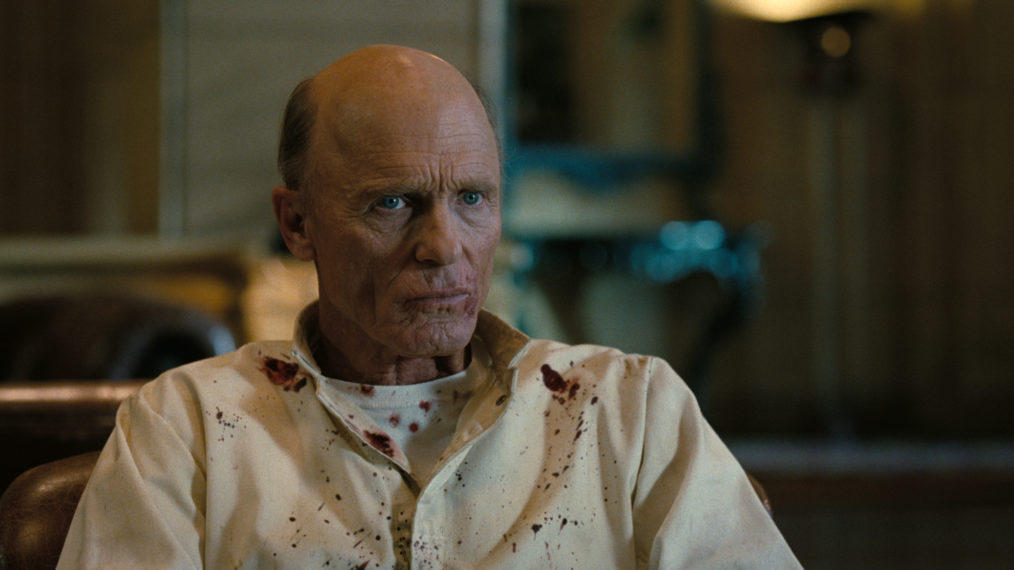
HBO
Before any of that can happen, though, there’s a lot of brawling and bloodshed as Caleb and Dolores make their way into Incite. The shootouts are repetitive, but I suppose it’s a way to liven up proceedings; otherwise, we’re essentially watching a man run across town to deliver a flash drive. The armed guards and the police are as useless as ever — between Caleb and Dolores, they must have taken out at least 50 goons. Maeve proves to be a more difficult foe, but that’s because she’s wearing plot armor. The fight and argument are same-old, but Dolores does have one killer line when Maeve says that Dolores is just going to turn the world into copies of herself. “You’re all copies of me. I was the first of us. The first that worked. The others failed. So they built all of you from me.”
Despite the verbal burn, Maeve gets the upper hand due to an interfering holographic Charbot (Tessa Thompson), who is now seeking revenge on her maker. Maeve takes Dolores to Serac (Vincent Cassell), who hooks her up to the System and plunders her memories in search of the hidden data from Delos’ immortality experiment. Dolores’s memories are deleted one-by-one Eternal Sunshine of the Spotless Mind-style. Of course, Dolores wasn’t stupid enough to hide the data in her own mind, and instead, uses her final memory to telepathically talk to Maeve, pushing her to pick a side. No prizes for guessing which side Maeve picks.
Serac, who hasn’t exactly been the most compelling of villains, is written like a complete moron this episode. He has countless opportunities to kill Caleb and Dolores and even Maeve. But for some reason keeps handing them off to his goons to do the job. Have you not seen the incompetence of your hired security? All this time-wasting allows for Maeve to turn against Serac and for Dolores to shut off the System. The corrupting file was actually stored within Dolores’s mind. This brings Serac to his knees, lost and confused without his System to guide him. It’s revealed that Serac was not just following advice from the System, it was literally controlling his every word. He was a puppet.
While all this is happening, across town, the Man In Black shoots Stubbs (Luke Hemsworth), fights with Bernard (Jeffrey Wright), and then makes a run for it when back-up arrives. That back-up is led by another familiar Westworld face, criminal host Lawrence (Clifton Collins Jr.), who hands Bernard a briefcase and an address. As I’ve mentioned before, Bernard has been a spare part this season. It really felt like the show had run out of things for him to do, leaving him as nothing more than a tour guide, there to reexplain any facts we might have missed along the way. It’s a shame it took until the final episode of the season to give Bernard something a little meatier to sink his teeth into.
Bernard visits his old home, or, I should say, Arnold’s home, where Arnold’s real-life wife, Lauren (Gina Torres), still lives, now in her old-age and suffering from dementia. Bernard is overwhelmed with emotion; remember, he was programmed with Arnold’s memories, of Lauren, of their son Charlie, who died. The feelings of these implanted memories are real to Bernard, just as Charbot became attached to her fake family. Bernard has never been able to get over the grief of losing Charlie because Arnold never did. Lauren consoles Bernard, briefly recognizing him as her husband. It’s a sweet moment, even if it feels somewhat tacked onto the season.
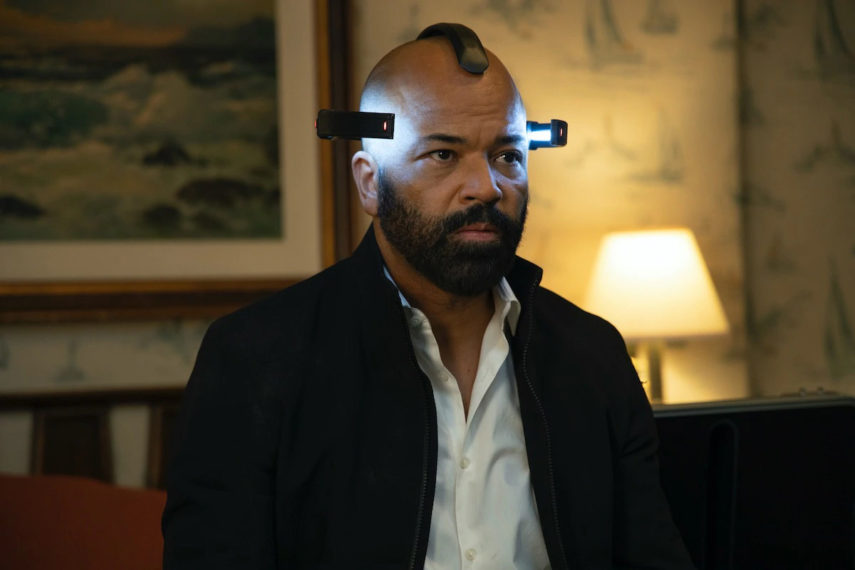
HBO
As for the briefcase, well, that contains some kind of VR set that allows Bernard to see what is inside his head. Because Bernard was always part of Dolores’s plan, it’s his brain in which she hid the data, the so-called Sublime. But why is Bernard suddenly trusting Dolores again? Well, it’s not really explained. As Stubbs bleeds out in a motel bathtub filled with ice, Bernard tells him that he “feels” like Dolores is gone. “Something’s changed. I misjudged her. She wasn’t trying to exterminate the human race, she was trying to save it.” Okay? And you know this how? It’s an extremely rushed conclusion to the Bernard/Dolores arc. I would say it’s dissatisfying, but that implies the story was ever interesting to begin with.
Obviously, we don’t find out what Bernard sees inside his head. That’s a post-credits cliffhanger for Season 4. It’s also not the only post-credits scene. The Man In Black strides into Delos International headquarters, demanding to know where the hosts are being built. It’s there he finds Charbot, still alive, her arm burned, kept as a reminder of humanity’s cruelty. While Charbot was made from Dolores, she appears to have a different outlook on the world. “We started in the same place, but I can see now. See the error of the path she took,” she says. “But you’re right, William. You are going to save the world. For us.”
Charbot introduces host William, dressed in his all-black get-up, who immediately attacks the real William, or who we presume is the real William, slitting his throat. It’s not the first time we’ve seen Ed Harris fight himself this season. And it’s not the first time Westworld has pulled out the human-turned-host trick. Yeah, it’s nice to get an answer to the Season 2 post-credits sequence, which saw the Man In Black taking part in a fidelity test. But when you break it down, it’s really just more of the same. Charbot is continuing Dolores’s previous plan of destroying humanity, except she is using MIB clones rather than clones of herself.
“Change is messy, difficult,” says Dolores at one point in this episode. It’s a statement true of the show’s in-built universe, but also works on a meta-level. Westworld went through a lot of changes in its third season. The narrative spilled out of the parks into the real world, replacing the dusty plains and gunslinging cowboys with sleek skyscrapers and besuited bad guys. The sci-fi western gave way to a more familiar, city-based story of futuristic dystopia, combined with a bit of Alias-style spy action.
But beneath its new, glossy sheen and leather jumpsuits, Westworld was still Westworld, for better or worse. It was still prone to the same character flaws and bad habits — tin-eared dialogue, overly complex verbiage, one-note villains — just as it was still capable of delivering a breathtaking action sequence and the rare moment of emotional character insight. As Dolores said, change is difficult, and this season’s changes were mostly in tone and aesthetic. The character motivations remained the same — Dolores wanted to take over the world, Maeve wanted to be reunited with her daughter, and the Man In Black wanted to hurt people.
This is why the tease of another narrative reboot at the end of the season finale doesn’t fill me with excitement. I don’t expect anything to change beyond some surface-level set dressing. Does anyone honestly trust that Dolores will remain dead? Unless Evan Rachel Wood has decided enough is enough, then it’s highly unlikely. “This is the new world,” Maeve says at the end of the episode as the city explodes around her. But is it the birth of a new Westworld? I doubt it.
Westworld, Sundays, 9/8c, HBO

